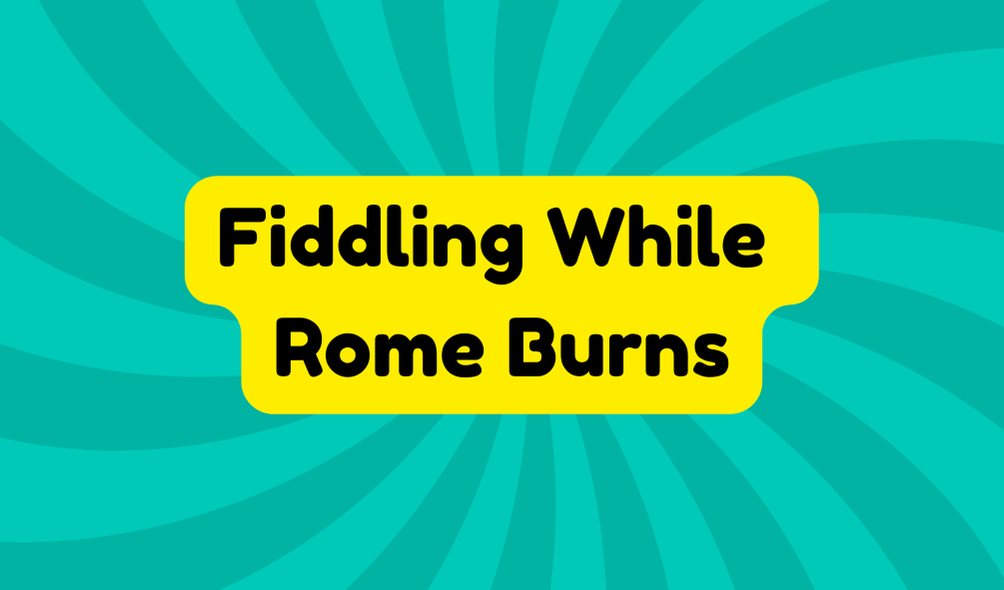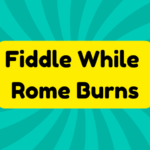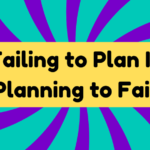"Fiddling while Rome burns" refers to the act of ignoring urgent issues while focusing on trivial matters. This phrase critiques leaders who prioritize inconsequential activities in times of crisis. For instance, a corporation might emphasize redecorating instead of ensuring employee safety. Such actions can transform small problems into larger ones due to neglect. The relevance of this phrase today underscores the importance of prioritizing critical matters, especially in leadership roles. One can explore further implications and insights.
Synonyms
The concept of neglecting important matters in favor of trivial pursuits has several synonyms that capture its essence. These alternatives convey a similar critique of misplaced priorities, especially when urgent matters demand attention. Here are three notable terms:
- Dawdling – Wasting time on unimportant tasks while ignoring pressing issues.
- Frittering away time – Engaging in minor activities that distract from serious obligations.
- Lollygagging – Indulging in aimless behavior instead of addressing critical challenges.
Each synonym underscores a pervasive tendency to prioritize the inconsequential, leaving urgent matters unresolved during times of chaos and distress.
Example of Sentences
Engaging in trivial pursuits while ignoring significant issues is a common critique in various contexts, where urgency is often overshadowed by distraction. Examples provided illustrate this phenomenon, revealing modern implications:
- A corporation focuses on redecorating office spaces while neglecting workers' safety protocols.
- Politicians debate minor policy changes while major crises remain unresolved.
- Students spend hours on social media, avoiding pressing academic responsibilities.
Such behaviors highlight a concerning trend where critical situations are disregarded, resulting in greater long-term problems. Ultimately, these instances reflect a societal tendency to prioritize the inconsequential over the imperative, warranting closer examination.
Origin
Nero's legacy is often overshadowed by the infamous tale of his behavior during the great fire of Rome in AD 64. Historical interpretations of Nero's actions during this crisis remain deeply divided. Some accounts portray him as indifferent, allegedly playing music while the city burned, although this depiction is historically inaccurate; he likely played a lyre instead of a fiddle. The ongoing debate raises questions about the credibility of ancient sources and the complexities of leadership under duress. This ambiguity challenges readers to critically assess the narratives surrounding such significant historical events and the figures involved, encouraging a more nuanced understanding.
Collocations
Collocations associated with the phrase "fiddling while Rome burns" highlight the varied contexts in which the expression is used. This phrase encapsulates significant themes, such as:
- Trivial distraction from urgent negligence.
- Indifference in the face of crisis.
- Prioritization of petty activities over essential duties.
These combinations reveal how society often engages in inconsequential pursuits while critical issues languish unattended. This behavior serves as a cautionary note, urging individuals and leaders alike to reflect on their priorities, particularly in moments that demand their focused attention, lest they be condemned for allowing dire circumstances to persist unaddressed.
How to Use in Everyday Language
The phrase "fiddling while Rome burns" serves as a vivid reminder of how easily individuals can become sidetracked by insignificant tasks, especially during critical moments. In discussions about emergency response situations, it highlights the dangers of leadership negligence. When leaders focus on trivial matters while urgent issues unfold, they risk exacerbating crises. This phrase can be used to critique individuals or organizations that ignore pressing challenges. It serves as a call to prioritize essential actions, urging decision-makers to remain vigilant and proactive, rather than indulging in distractions while chaos arises, thereby ensuring better preparedness in uncertain times.
Why Is It Still Relevant Today?
How can a phrase from ancient history still resonate in modern society? "Fiddling while Rome burns" continues to hold relevance today as it encapsulates the tendency of leaders and individuals to become consumed by inconsequential tasks during critical times. In the context of crisis management, this phrase serves as a stark reminder of leadership neglect. As pressing issues arise, decision-makers often prioritize trivial matters instead of addressing urgent needs. This behavior not only detracts from effective governance but can exacerbate crises. Ultimately, the phrase highlights the importance of vigilance and focused leadership in maneuvering through complex challenges that demand immediate attention.







